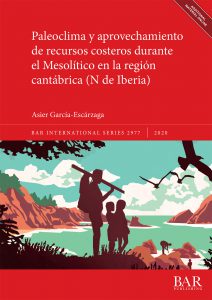Asier García Escárzaga, Palaeoshells team member, has published his PhD thesis on BAR Publishing.

Asier García Escárzaga, Palaeoshells team member, has published his PhD thesis on BAR Publishing.

Our project has been well represented at the XV National Quaternary Meeting held in Bilbao between the 1st and 5th of July, with two communications presented by Asier García-Escárzaga and Roberto Suárez-Revilla, respectively. Asier presented the work entitled “The 8.2k event in the Cantabrian region from marine (oxygen isotopes in gastropods) and terrestrial (pollen) indicators”, including the information obtained about this peculiar cold event in the excavations of El Mazo Rockshelter (Asturias, Spain). Roberto defended the communication entitled “Climate changes between the Late Glacial Maximum and the early Holocene in the Cantabrian Region derived from the analysis of stable oxygen isotopes in seashells”, in which he reviewed the isotopic data obtained from the analysis of limpets from various sites in the region and their climatic implications. In both communications, the IP of the project, Igor Gutiérrez Zugasti, also participated as an author.
Recently, the researchers of the Palaeoshells project Asier García-Escárzaga and Stefania Milano (Max Planck Institute) participated in the 5th International Sclerochronology Conference, held in Split (Croatia). Asier presented a communication entitled “Shell sclerochronology and stable oxygen isotope ratios from the limpet Patella depressa Pennant, 1777: Implications for palaeoclimate reconstruction and archeology in northern Spain”. The work, also authored by Igor Gutiérrez-Zugasti, Manuel R. González-Morales, Javier Fernández-Eraso and Patrick Roberts, presented the isotopic study performed on limpets of the species Patella depressa with the aim of determining the validity of this species to reconstruct past climatic conditions and establishing the seasonal exploitation patterns by prehistoric human societies.
Stefania defended the communication entitled “Temperature-induced mineralogical transformations of aragonitic mollusc shells”, a study on the effect of temperature in the carbonate of the shells of the species Phorcus turbinatus and its influence on diagenetic alterations.
